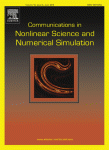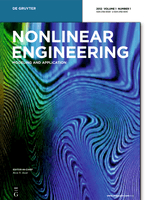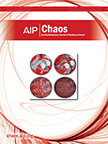
Top
Scope & Guideline
Pioneering Research Across Diverse Mathematical Disciplines
Introduction
Aims and Scopes
- Machine Learning and AI Applications:
A significant portion of the journal's content focuses on the application of machine learning and artificial intelligence to solve complex problems in physics, biology, and engineering, reflecting a growing trend towards data-driven methodologies. - Dynamics and Control Systems:
Research on the dynamics, control, and synchronization of complex systems, including neural networks, robotic systems, and fluid dynamics, is prominently featured, indicating an emphasis on both theoretical exploration and practical implementation. - Nanofluid and Thermal Dynamics:
The journal publishes extensive studies on nanofluid behaviors and thermal dynamics, exploring their applications in energy systems, biomedical engineering, and environmental science, highlighting the relevance of nanotechnology in modern research. - Epidemiological Modeling:
With the recent global health challenges, the journal includes a substantial number of papers on mathematical modeling of infectious diseases, particularly COVID-19, showcasing the importance of quantitative analysis in public health. - Astrophysics and Particle Physics:
The journal addresses foundational questions in particle physics and astrophysics, including studies on neutrinos, dark matter, and cosmic phenomena, indicating a strong commitment to fundamental scientific inquiries. - Fractional Calculus and Complex Systems:
Papers exploring fractional calculus and its applications in various complex systems are prevalent, demonstrating the journal's focus on advanced mathematical techniques for modeling real-world phenomena.
Trending and Emerging
- Quantum Computing and Quantum Technologies:
Research related to quantum computing, quantum information science, and applications of quantum technologies is rapidly increasing, showcasing the journal's commitment to cutting-edge advancements in this area. - Multistability and Chaotic Systems:
There is a growing interest in the exploration of multistability and chaotic behaviors in various systems, indicating a trend towards understanding complex dynamics and their applications in fields such as neuroscience and engineering. - Sustainable Energy and Environmental Dynamics:
Papers addressing sustainable energy solutions and environmental dynamics, particularly those integrating nanotechnology and advanced materials, are becoming more prominent, reflecting a global emphasis on sustainability. - Neuroscience and Brain Dynamics:
With a notable increase in research on neural networks and brain dynamics, the journal highlights a trend towards understanding complex biological systems and their implications for health and technology. - Advanced Materials and Nanotechnology:
The journal is increasingly featuring research on advanced materials, particularly nanomaterials and their applications in various fields, indicating a strong trend towards innovation in material science.
Declining or Waning
- Classical Mechanics and Traditional Physics:
There has been a noticeable decline in papers strictly focused on classical mechanics, as researchers increasingly gravitate towards complex systems and interdisciplinary studies that incorporate modern technologies and theoretical frameworks. - Static Models in Epidemiology:
The focus on static or deterministic models in epidemiology has waned, with more researchers favoring dynamic and stochastic approaches that better reflect the complexities of disease spread and control. - Traditional Imaging Techniques:
Research centered around traditional imaging techniques has seen a decrease as newer, more advanced imaging technologies and methodologies gain prominence and attention in the scientific community.
Similar Journals

Communications in Nonlinear Science and Numerical Simulation
Advancing the Frontier of Nonlinear Science and SimulationCommunications in Nonlinear Science and Numerical Simulation is a premier journal published by ELSEVIER, dedicated to advancing the field of applied mathematics and numerical analysis. With an impressive Q1 ranking in categories such as Applied Mathematics, Modeling and Simulation, and Numerical Analysis, this journal stands out as a vital resource for researchers and professionals alike. Established in 1996, it consistently features high-quality research contributions, and its current Scopus rankings highlight its influence and relevance in the field, placing it in the 92nd percentile for Applied Mathematics and 91st for Numerical Analysis. The journal not only disseminates pivotal findings but also encourages the exploration of nonlinear phenomena and innovative numerical methods. Scholars engaged in computational methodologies and modeling can benefit from its rigorous peer-reviewed articles, fostering collaboration and knowledge exchange within the academic community. Located in the Netherlands, Communications in Nonlinear Science and Numerical Simulation remains a touchstone for cutting-edge research through effective dissemination of ideas that shape future mathematical landscapes.

Applied Mathematics in Science and Engineering
Empowering Innovation through Applied Mathematics.Applied Mathematics in Science and Engineering is a prestigious academic journal published by TAYLOR & FRANCIS LTD, dedicated to presenting innovative research at the intersection of applied mathematics, science, and engineering disciplines. Since its inception as an Open Access platform in 2022, this journal has empowered researchers worldwide to disseminate their findings without barriers, enhancing knowledge-sharing among scholars, professionals, and students. Covering a wide range of topics, including but not limited to mathematical modeling, computational methods, and engineering applications, Applied Mathematics in Science and Engineering aims to foster interdisciplinary collaboration and advance the field through high-quality research articles. With a commitment to rigorous peer review and academic excellence, this journal serves as an essential resource for anyone seeking to stay at the forefront of applied mathematics in contemporary scientific inquiry.

Journal of Physics-Complexity
Pioneering Open Access Research in Complexity and AIThe Journal of Physics-Complexity, published by IOP Publishing Ltd, is a premier open access journal that has been making significant strides in the fields of Artificial Intelligence, Computer Networks and Communications, Computer Science Applications, and Information Systems since its establishment in 2020. Operating from the United Kingdom, this journal aims to foster interdisciplinary research that bridges theoretical and applied aspects of complexity science. With an admirable Q2 ranking in four prestigious categories and a Scopus ranking indicating it holds a solid position within its fields, this journal caters to a diverse audience of researchers, professionals, and students eager to explore the intricacies of complex systems. Its open access model ensures that groundbreaking research is readily available to the global community, thereby enhancing the dissemination of knowledge and information. As it converges towards 2024, the Journal of Physics-Complexity is poised to expand its influence, inviting innovative contributions that challenge conventional thinking and push the boundaries of scientific discovery.

Networks and Heterogeneous Media
Connecting Ideas, Advancing ScienceNetworks and Heterogeneous Media is a distinguished journal published by the American Institute of Mathematical Sciences (AIMS), focusing on the dynamic interplay of networks across various interdisciplinary fields including applied mathematics, computer science, and engineering. With a diverse and robust scope, the journal aims to facilitate the advancement of knowledge regarding complex systems and heterogeneous media through the publication of cutting-edge research. The journal has exhibited notable academic impact, currently positioned in Q2 and Q3 quartiles across several key categories such as applied mathematics, engineering, and statistics, indicating its relevance and influence within the scientific community. Researchers and professionals exploring intricate mathematical models, computational applications, and statistical methodologies will find Networks and Heterogeneous Media an invaluable resource for both foundational studies and innovative applications. The journal regularly publishes high-quality articles, contributing to emerging discussions and developments in a rapidly evolving field.

Nonlinear Engineering - Modeling and Application
Connecting Theory and Application in Nonlinear EngineeringNonlinear Engineering - Modeling and Application is a premier journal dedicated to advancing the fields of engineering, modeling, and simulation, published by De Gruyter Poland Sp. z o.o. since 2012. With an impressive impact factor reflected in its prestigious rankings—Q2 in Chemical Engineering and Miscellaneous Engineering and Q3 in Computer Networks and Communications—this journal serves as an invaluable resource for researchers and practitioners seeking to explore the intricacies of nonlinear systems and their applications. As an Open Access journal since 2019, it ensures that groundbreaking research is readily available to the global community, fostering collaboration and innovation. Situated at the forefront of its field, Nonlinear Engineering provides high-quality, peer-reviewed articles that contribute to understanding complex phenomena in various engineering disciplines, making it an essential publication for those eager to stay on the cutting edge of technology and research.

CHAOS
Pioneering Research at the Intersection of ScienceCHAOS, an esteemed journal published by AIP Publishing, is a cornerstone of interdisciplinary research, focusing on the intricate dynamics of complex systems across various scientific domains. With a balanced impact factor, this journal emphasizes high-quality contributions in Applied Mathematics, Mathematical Physics, and Statistical and Nonlinear Physics, while also exploring intersections with Medicine and Physics and Astronomy. With rankings showing a remarkable percentile placement, notably #7 in Mathematical Physics and #10 in Statistical and Nonlinear Physics, CHAOS has established itself as a leading platform for disseminating groundbreaking research since its inception in 1991. This journal not only aims to foster collaboration among scientists but also to advance theoretical and computational frameworks that unravel the complexities of chaotic systems. Researchers, professionals, and students alike will find rich insights and innovative theories within its pages, making it an invaluable resource in the pursuit of knowledge and understanding in the modern scientific landscape.

NONLINEAR DYNAMICS
Pioneering Research in Diverse Engineering FieldsNONLINEAR DYNAMICS is an esteemed academic journal published by SPRINGER, focusing on a diverse range of topics within the fields of Aerospace Engineering, Applied Mathematics, Control and Systems Engineering, Electrical and Electronic Engineering, Mechanical Engineering, and Ocean Engineering. Since its inception in 1990, this journal has become a premier platform for disseminating cutting-edge research and innovative methodologies from both theoretical and practical perspectives. With a high impact factor and ranked in the Q1 quartile across several engineering and mathematics categories, NONLINEAR DYNAMICS is recognized for its significant contribution to advancing knowledge and technology in nonlinear phenomena. Researchers and professionals are encouraged to engage with this journal to publish their findings and stay at the forefront of developments. Although it does not offer open access options, the journal ensures rigorous peer review, enhancing the credibility and visibility of published work.

Journal of Systems Science & Complexity
Advancing Knowledge in Computer Science and Information Systems.The Journal of Systems Science & Complexity, published by SPRINGER HEIDELBERG, stands as a leading forum for innovative research in the fields of computer science and information systems. With an ISSN of 1009-6124 and an E-ISSN of 1559-7067, this journal has established itself within the academic community, garnering a commendable impact factor that reflects its influential contributions. Operating from 2006 and continuing through 2024, it is categorized in the Q2 quartile for both Computer Science (Miscellaneous) and Information Systems, indicating its quality and relevance. Recognized within Scopus rankings, it places 52nd out of 133 in its specific field, affirming its significance in advancing systems science discussions. Researchers and professionals will find a wealth of knowledge through rigorous peer-reviewed articles that explore complex systems and their applications, enabling readers to stay at the forefront of technological advancements and interdisciplinary collaboration.

Acta Mechanica et Automatica
Fostering Collaboration in Mechanical and Control SystemsActa Mechanica et Automatica is a leading open-access journal published by SCIENDO, dedicated to the dynamic fields of Mechanical Engineering and Control and Systems Engineering. Since its inception in 2012, this journal has provided a vital platform for researchers and professionals to disseminate innovative findings and advances within these disciplines, boasting a convergence of years up to 2024. Based in Warsaw, Poland, the journal has embraced open access since 2013, ensuring broad dissemination of knowledge for the academic community globally. With a current Scopus ranking placing it in the 25th to 31st percentile among its peers, it plays an essential role in fostering scholarly communication and collaboration. The objectives of Acta Mechanica et Automatica include promoting original research, facilitating dialogue between disciplines, and enhancing the understanding of complex mechanical and control systems. This journal is invaluable for researchers looking to explore cutting-edge methodologies, theories, and applications in engineering.

Fractal and Fractional
Charting New Territories in Mathematical ExplorationFractal and Fractional is a prestigious open access journal published by MDPI since 2017, dedicated to advancing the study of fractals and fractional calculus, crucial fields that bridge mathematics, physics, and engineering. With an E-ISSN of 2504-3110 and based in Switzerland, this journal serves as a vital platform for disseminating cutting-edge research and innovative applications. As of 2023, it holds an impressive Q2 quartile ranking in multiple categories including Analysis, Statistical and Nonlinear Physics, and Statistics and Probability, placing it among the top tier of academic publications. Researchers will find valuable insights into contemporary issues within its scope, supported by robust metrics such as Scopus rankings which highlight its significant impact in the fields of Mathematics and Physics. Since its inception, Fractal and Fractional has garnered a reputation for quality and accessibility, making it an essential resource for academics and practitioners engaged in the exploration of complex systems and mathematical phenomena.